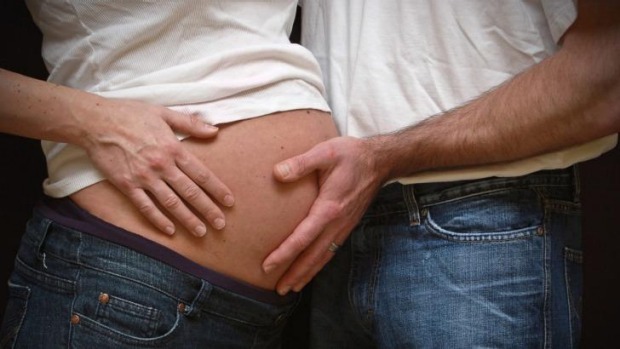
Over a long weekend in 2011, my husband and I left our twin boys - who had just turned 1 - with my parents, to head out for two nights in West Palm Beach. We'd never left our babies overnight; in fact, we were so swallowed up by first-time parenthood, we'd barely left them at all.
But there was the promise of an open bar at our good friends' wedding and all-night dancing. There was the lure of sunshine, adult conversation and blissful uninterrupted sleep. So we went. And it was frikkin' awesome.
Back home just a few days later, I wrote a post on my personal blog, whining about being awakened at 2:30 a.m. by a crying baby. "Grrr!" I wrote. "It's nights like these that make me remember why I don't want to have another baby."
Three weeks later, I was staring at a positive pregnancy test, slack-jawed, stunned and solidly into my first trimester.
We had just gotten comfortable enough with our boys to finally leave them with their grandparents for a weekend. We were starting to see glimpses of our old selves coming back - a warm and familiar light at the end of the twin toddler tunnel. How could this have happened? (Yes, I know how it happened, wise guys.)
We worried about so many things in the blur of those first few weeks: How would we make this work financially, emotionally, practically? Who would care for three small children during the day while the two of us worked full time? How would we pay for this person? Where would we fit another child in our rowhouse? Was adding another baby so soon fair to our boys? Could our marriage survive three children under age 2?
Who even has three children these days?
When my parents were born in the 1950s, couples regularly had four children or more. Today, many studies indicate that most Americans think a small family - two children or fewer - is ideal. And anecdotally, I can count on one hand (with fingers to spare) the number of close friends who have more than two children.
I get it. Kids are a lot. Pick a category - money, time, energy, emotion, peace - and you better believe kids take up a lot of it. And the more kids you have, the quicker that lot gets sucked bone-dry.
I thought I knew anxiety before having kids. I thought I knew guilt. I thought I knew what exhausted felt like. I thought I knew the meaning of cash-strapped.
Having twins taught me that I knew nothing. What other hard lessons would having a third impart?
I slogged through the first weeks of pregnancy stressed and mopey, and even a little resentful. Being just a smidge Type A, I much prefer it when I have a plan and everything goes according to it. This post-Palm Beach baby was a certified plan-smasher, a curveball with a heartbeat.
But as she grew, Curveball seemed less an accident and more a blessing. The terrible idea of three children slowly sweetened, until it became tolerable and, ultimately, desirable.
I remember our first time alone together in the darkened hospital room, the day she was born. It was the first time I had the experience of snuggling just one baby for as long as my heart desired, without having to worry about the other baby. I held Curveball for what seemed like hours, staring, marveling - the light above the hospital bed shining on her face like a sunbeam.
I thought our family had been complete with our two boys. I had no idea how much I needed Clair until she was here.
Is life harder having three children? Of course it is. But it is so much fuller, too. I was never all that good at math, but I remember learning in elementary school that three is greater than two. That, I can now confirm, is true.
The beauty of loving children is that adding more doesn't divide the love. It multiplies it.
So join me at the open bar (that started this whole thing). C'mon. Have another.
The Baltimore Sun